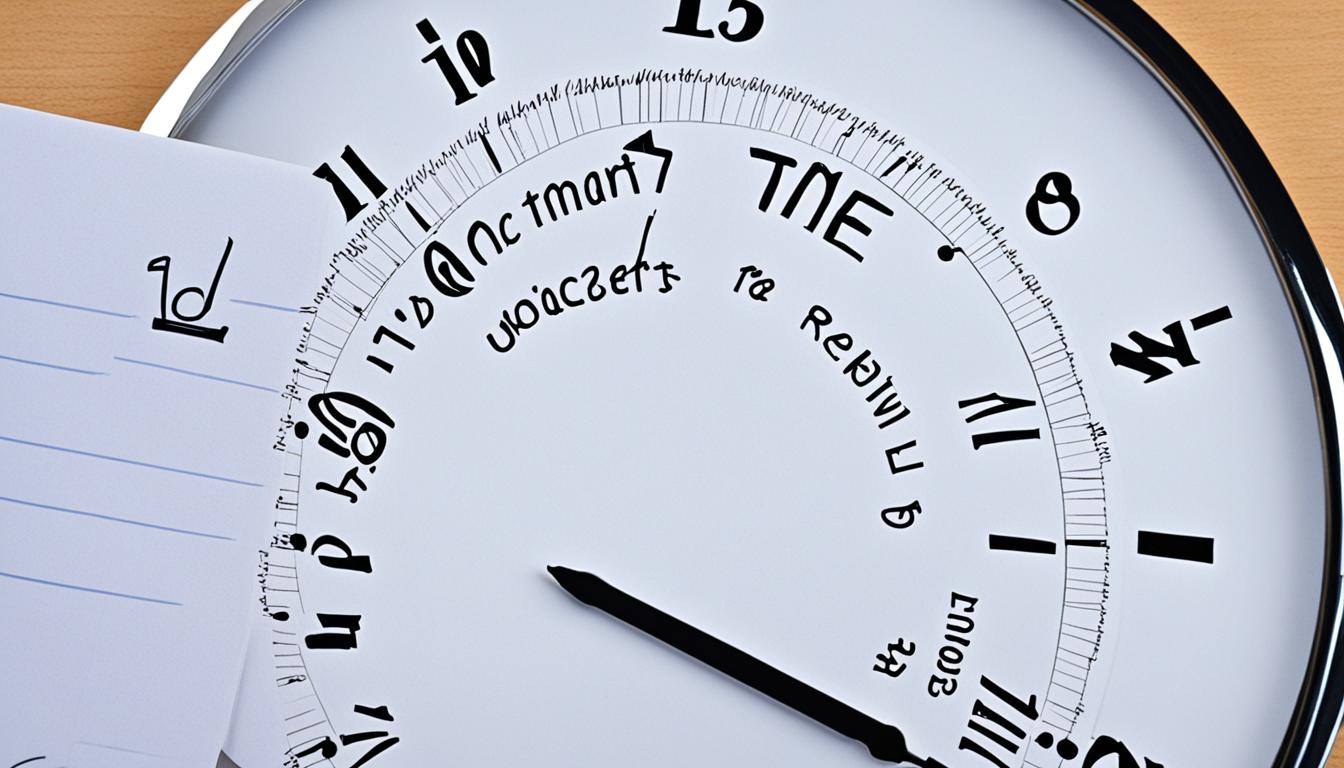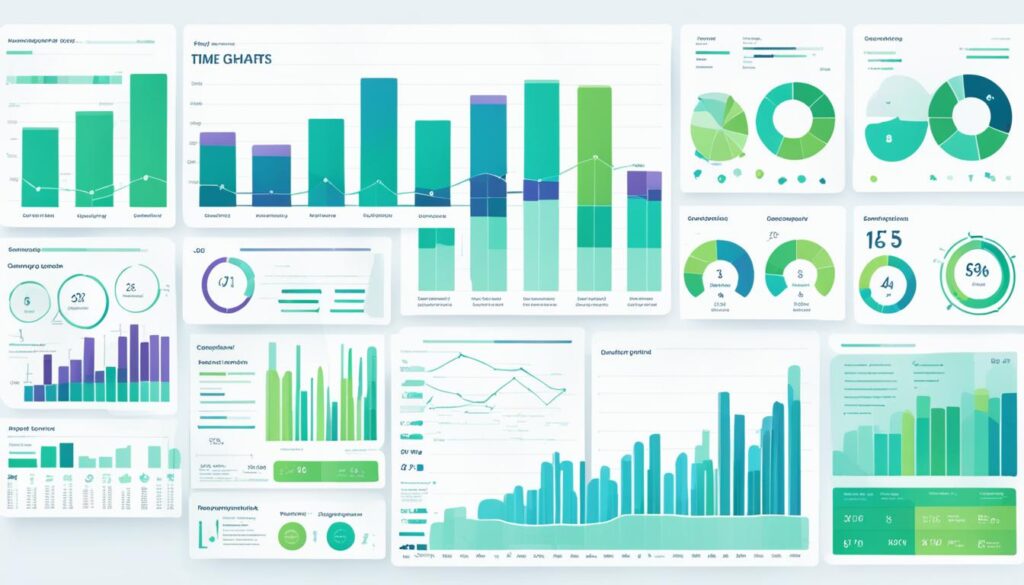Master Performance Review Time Management Now!

“Time management is the key to success. Prioritize your tasks, focus on what matters, and make every minute count.”
Welcome to our article on mastering performance review time management! As a manager, evaluating your team members’ time management skills is essential for improving productivity, efficiency, and professional development. By implementing effective performance review strategies, you can identify areas for improvement, set goals, provide feedback, and drive overall growth.
Key Takeaways:
- Performance reviews provide an opportunity to assess and address time management skills.
- Setting SMART goals is crucial for effective time management evaluation.
- Feedback tools help gather multiple perspectives on time management skills.
- Observing behaviors reveals how team members manage their time and interact with others.
- Mastering performance review time management leads to excellence in evaluations and overall performance optimization.
Set SMART Goals for Effective Time Management
One of the most important steps towards evaluating and improving time management skills is to set SMART goals for each team member. SMART is an acronym that stands for Specific, Measurable, Achievable, Relevant, and Time-bound. By setting goals that adhere to these criteria, you can create a framework for effective time management and ensure clarity in expectations.
Specific: Goals should be clear and well-defined. They should focus on specific tasks or objectives that need to be accomplished.
Measurable: Goals should have measurable criteria that enable progress tracking. This allows you to determine whether you are on track or if adjustments are necessary.
Achievable: Goals should be realistic and attainable. They should consider the individual’s skill set and available resources, ensuring that they are within reach.
Relevant: Goals should be aligned with the overall objectives of the team or organization. They should contribute to the larger picture and have a direct impact on productivity and success.
Time-bound: Goals should have a defined timeline for completion. By setting deadlines, you create a sense of urgency and encourage timely action.
Setting SMART goals not only helps you clarify expectations, but it also aids in tracking progress and measuring results. It allows you to identify any gaps, challenges, or barriers that may be hindering effective time management. By monitoring missed deadlines, incomplete tasks, communication habits, and seeking feedback from colleagues, you can gain a comprehensive understanding of each team member’s time management skills.
Smart Goals Table
| Specific | Measurable | Achievable | Relevant | Time-bound |
|---|---|---|---|---|
| Set a daily schedule for completing tasks | Track the number of tasks completed per day | Allocate realistic timeframes for each task | Focus on tasks that advance project goals | Complete all tasks by the end of the workday |
| Prioritize tasks based on importance and urgency | Create a list of priority tasks for each day | Focus on high-priority tasks before lower-priority ones | Contribute to the achievement of team objectives | Complete priority tasks before the end of the day |
| Improve communication by responding promptly to emails | Reduce response time to emails by 50% | Develop efficient email management strategies | Enhance collaboration and information sharing | Respond to all emails within 24 hours |
By setting and evaluating SMART goals for each team member, you can effectively assess their time management skills, identify areas for improvement, and create a roadmap for progress. This will not only enhance individual performance but will also contribute to the overall efficiency and success of the team.
Use Feedback Tools to Assess Time Management Skills
Feedback tools are powerful resources for evaluating and improving time management skills within your team. By leveraging tools such as surveys, questionnaires, and self-assessments, you can gather diverse perspectives and valuable insights to promote comprehensive understanding and growth. These feedback tools enable you to prioritize, plan, organize, and execute tasks effectively while coping with stress, distractions, and interruptions.
Surveys, questionnaires, and self-assessments provide individuals with an opportunity to reflect on their strengths and weaknesses in time management. They offer a structured approach to evaluate key areas such as prioritization, planning, organization, task execution, and stress management. By engaging team members, peers, and even customers in this process, you can gain different perspectives that contribute to a holistic view of performance.
Through feedback tools, you can uncover patterns, identify areas for improvement, and develop targeted strategies to enhance time management skills. For example, surveys can explore preferences for time management techniques or gauge the impact of distractions on productivity. Questionnaires can focus on specific aspects such as setting goals, dealing with interruptions, or managing deadlines. Self-assessments allow individuals to assess their own strengths and weaknesses, providing a self-reflective lens for improvement.
By incorporating feedback tools into performance evaluations, you empower your team to take ownership of their time management skills. The comprehensive insights gained from these tools enable constructive conversations about strengths and weaknesses, fostering a growth-oriented mindset. This approach enhances accountability and self-awareness, leading to an overall improvement in time management practices.

Example of a Time Management Self-Assessment
Below is an example of a time management self-assessment that can be used to evaluate strengths and weaknesses in this skill area:
| Time Management Skill | Strengths | Weaknesses |
|---|---|---|
| Prioritization | I can identify and focus on the most important tasks. | I sometimes struggle to determine which tasks are most important. |
| Planning | I create detailed plans and timelines for my projects. | I often underestimate the time required for certain tasks. |
| Organization | I keep my workspace and digital files well-organized. | I occasionally struggle to find relevant documents or information. |
| Task Execution | I consistently meet deadlines and complete tasks on time. | I sometimes get overwhelmed and struggle to manage multiple tasks concurrently. |
| Stress Management | I effectively manage stress and maintain a balanced approach to work. | I occasionally feel overwhelmed and find it challenging to cope with stress. |
This self-assessment provides individuals with a structured framework to assess their abilities in key time management skills. By reviewing the strengths and weaknesses identified, individuals can create targeted action plans to improve their time management practices.
Remember, feedback tools offer a valuable opportunity to assess time management skills, bringing clarity and focus to areas of improvement. Embracing these tools as part of the evaluation process empowers individuals to develop and refine their time management abilities, ultimately boosting their productivity and overall effectiveness.
Observe Behaviors to Evaluate Time Management Skills
Observing behaviors such as punctuality, attendance, communication, and collaboration is a powerful approach to assess and improve time management skills in your team. These behaviors can provide valuable insights into how individuals manage their time and interact with others. By carefully observing and analyzing these behaviors, you can gain a comprehensive understanding of their approach to time management.
When evaluating punctuality, consider if team members consistently arrive on time for meetings and deadlines. It reflects their ability to prioritize and allocate time effectively. Additionally, assess their attendance record to identify any potential patterns or issues that may impact their time management skills.
Communication and collaboration play a crucial role in effective time management. Evaluate how team members communicate and interact with colleagues, stakeholders, and clients. Are they proactive in seeking clarification and providing updates? Do they actively contribute and engage in team discussions? These indicators demonstrate their ability to coordinate tasks and manage time efficiently.
Flexibility and adaptability are essential traits for successful time management. Assess how team members respond to changes, unexpected events, and shifting priorities. Are they proactive in adjusting their plans and schedules? Do they demonstrate resilience and resourcefulness in managing their time when faced with challenges? These behaviors reflect their ability to adapt and optimize their time management strategies.
On the other hand, be mindful of reactive, rigid, and resistant behaviors. These may indicate a lack of time management skills or an unwillingness to embrace change. Look for signs of resistance to new processes or an inability to manage time effectively when faced with unforeseen circumstances.
To assist in your evaluation, consider using a behavior observation checklist or rating scale to systematically track and record behaviors related to time management. This will provide a consistent framework for assessment and allow for objective comparisons across team members.
Overall, observing behaviors related to punctuality, attendance, communication, and collaboration is an effective strategy to evaluate time management skills. By gaining insights into these behaviors, you can identify areas for improvement and develop targeted strategies to enhance time management within your team.

Conclusion
Performance reviews play a crucial role in evaluating and improving time management skills, ultimately enhancing efficiency, productivity, and professional development. By incorporating strategies such as setting SMART goals, using feedback tools, observing behaviors, and discussing outcomes, you can effectively assess time management skills during performance evaluations.
During these evaluations, you have the opportunity to address challenges and implement improvement strategies that foster growth for both individuals and the organization as a whole. The evaluation process allows for the identification of areas of improvement and the implementation of targeted solutions that optimize overall performance.
Mastering performance review time management is the key to unlocking excellence in evaluations. It empowers you to maximize the potential of your team members, driving them towards continuous improvement and growth. By focusing on time management skills through performance reviews, you create a culture of efficiency and productivity that propels your organization towards success.
FAQ
How can I evaluate time management skills during a performance review?
You can evaluate time management skills during a performance review by setting SMART goals, using feedback tools, observing behaviors, and discussing outcomes. These strategies provide insights into an individual’s ability to prioritize, plan, execute tasks, cope with stress and distractions, and collaborate effectively.
What are SMART goals and how do they contribute to evaluating time management skills?
SMART goals are Specific, Measurable, Achievable, Relevant, and Time-bound goals that help clarify expectations, track progress, and measure results. By setting SMART goals, you can assess whether an individual has effectively managed their time to meet deadlines, complete tasks, and communicate and collaborate with others.
What are some feedback tools that can be used to assess time management skills?
Feedback tools such as surveys, questionnaires, and self-assessments are valuable in evaluating time management skills. These tools gather perspectives from individuals, team members, peers, and customers, providing insights into an individual’s prioritization, planning, organization, task execution, stress management, and ability to cope with distractions and interruptions.
How can observing behaviors help in evaluating time management skills?
Observing behaviors such as punctuality, attendance, communication, and collaboration can provide valuable insights into an individual’s time management skills. By assessing behaviors, you can determine whether an individual is proactive, flexible, and adaptable in managing their time, or if they exhibit reactive, rigid, and resistant behavior.
Why is performance review time management important?
Performance review time management is crucial for enhancing efficiency, productivity, and professional development. By effectively evaluating time management skills, you can address challenges, implement improvement strategies, and foster growth for both individuals and the organization as a whole. It allows for the optimization of overall performance.






